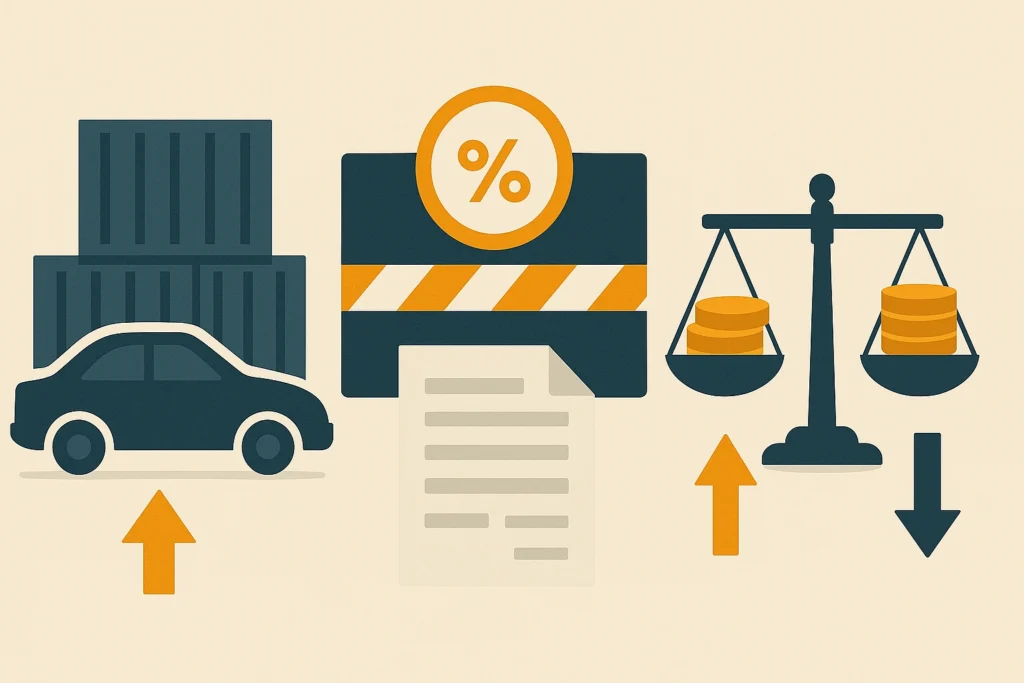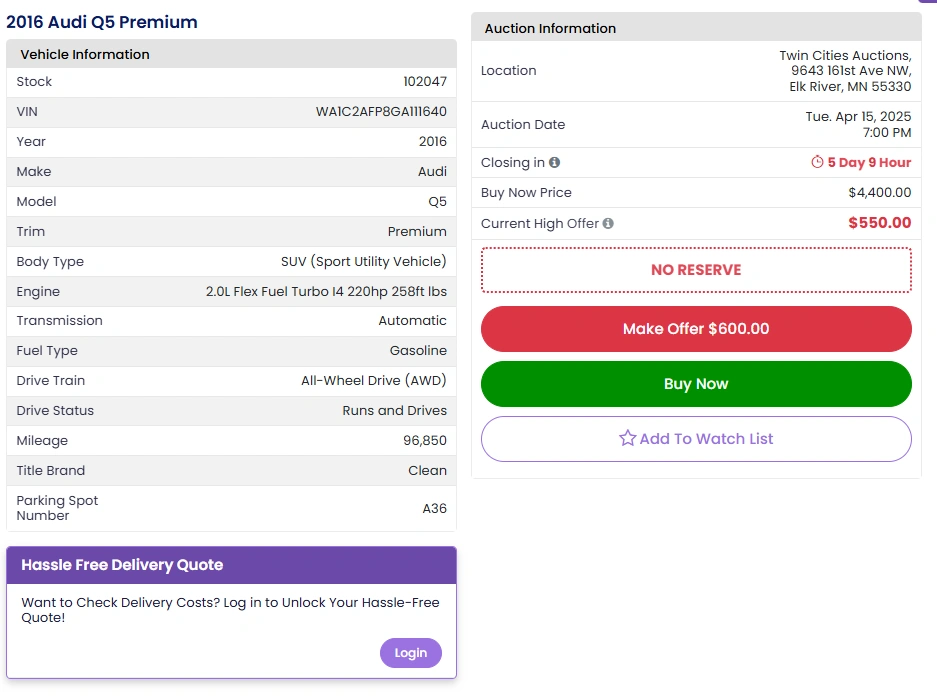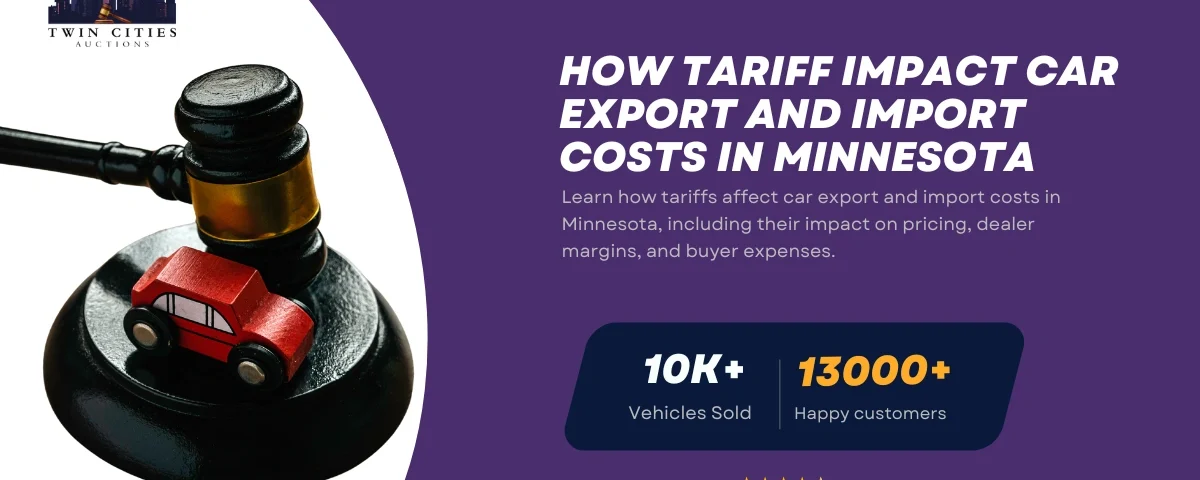Roughly one in eight vehicles sold in Minnesota in 2024 crossed a national border first, adding an average of $1 260 in tariff-related charges to the sticker price.
For dealers moving iron through Duluth-Superior or rail ramps in the Twin Cities, every percentage point in duty shows up on the bottom line.
This guide demystifies federal tariff rules, Minnesota-specific fees, and practical ways to keep landed costs, and export mark-ups under control.

Key Takeaways
- Understand how U.S. tariffs are calculated, collected, and enforced
- See the latest duty rates on cars, trucks, EVs, and parts
- Follow step-by-step landed-cost math for Minnesota imports
- Learn how EU, Canadian, and Chinese duties hit Minnesota exports
- Discover duty-saving tactics like drawback, FTZs, and USMCA rules
- Spot common compliance pitfalls and how to avoid fines
- Find out how Twin Cities Auctions simplifies origin paperwork and fee planning
How Car Tariffs Work
Tariffs are customs duties collected at the first U.S. port of entry. The rate depends on the Harmonized Tariff Schedule (HTS) code, origin country, and any special surcharges such as Section 232 or Section 301.
Importers file entry paperwork with U.S. Customs and Border Protection, pay duties within ten days through the Automated Commercial Environment, then clear the vehicle for inland transport. Minnesota’s closest seaport, Duluth-Superior, also charges wharfage and mooring fees on cargo that crosses its docks.
Current Tariff Rates on Popular Vehicle Categories
| Vehicle Type | Standard U.S. Duty | Special Surcharges 2024-2025 | Duty under USMCA |
| Passenger cars (HTS 8703) | 2.5 % | – | 0 % with NA origin |
| Light trucks (HTS 8704) | 25 % “Chicken Tax” | – | 0 % with NA origin |
| Electric vehicles from China | 2.5 % + 100 % Section 301 | Total 102.5 % | 0 % with NA origin |
| Major auto parts (HTS 8708) | 2.5 % | Up to 25 % on some Chinese parts | 0 % USMCA |
Impact on Car Imports into Minnesota
Follow the landed-cost math for a $25 000 Mexican-built crossover entering Minnesota via rail through Laredo:
- FOB factory price – $25 000
- Freight to Duluth rail ramp – $1 300
- Duty – 0 % (USMCA qualified)
- Port wharfage – $0 (rail arrival)
- Minnesota motor-vehicle sales tax – 6.875 % = $1 721
- Title and registration fees – $180
Total landed cost ≈ $28 201, about 8 % over FOB.
Now compare a German-built sedan:
| Cost Component | USMCA Vehicle | German Vehicle |
| FOB Price | $25 000 | $25 000 |
| Ocean + rail freight | $1 300 | $1 900 |
| U.S. duty | 0 % | 2.5 % = $625 |
| Duluth wharfage (0.90 ¢/ton) | $0 | $45 |
| MN sales tax 6.875 % | $1 721 | $1 864 |
| Total Landed Cost | $28 201 | $29 434 |
The tariff difference alone adds $1 233 to the German car before you even detail it for the showroom.
How Tariffs Affect Minnesota Car Exports
| Destination | Import Duty on U.S. Vehicles | Retaliatory Surcharge |
| European Union | 10 % | – |
| Canada | 6.1 % passenger cars | – |
| China | 15 % base + 25 % retaliatory = 40 % | Up to 100 % for EVs |
| United Kingdom | 10 % | – |
A Minnesota exporter shipping $45 000 pickups to France must account for $4 500 in EU duty plus value-added tax on entry—unless the trucks are disassembled into parts kits that qualify for the EU’s 4 % components rate.
Strategies to Mitigate Tariff Costs
- Duty drawback – reclaim up to 99 % of duties on imported parts that leave the country as finished vehicles
- Foreign-Trade Zones – store or assemble vehicles duty-free in FTZ #119 (Duluth) until they ship out
- USMCA qualification – source 75 % North-American content to hit regional-value thresholds
- Advanced rulings – lock in the lowest legal HTS code before shipment
- Ship parts, not trucks – import knock-down kits at 2.5 % and assemble in Minnesota to sidestep the 25 % truck duty
Common Pitfalls and How to Avoid Them
| Pitfall | Impact | Prevention |
| Incorrect HTS code | Up to 4× duty as penalty | Verify with CBP binding ruling |
| Missing USMCA certificate | Full MFN duty charged | Attach completed CBP 434 form |
| Undervaluation | Fines plus liquidated damages | Include assists and accessories in invoice |
| Late MN use-tax filing | 1 % per month penalty | File within 30 days of titling |
| Ignoring Duluth wharfage | Surprise dock fees | Add $0.90 per ton and mooring to budget |
Why Auctions Are a Smart Choice for Car Purchases
Auctions can be an excellent source for late-model vehicles with clear chains of title and affordable pricing. Twin Cities Auctions, based in Minnesota, is one such reputable auction house that offers a wide range of vehicles at competitive prices.
Key Benefits of Buying from Auctions:
- Wide Selection: Auctions like Twin Cities Auctions offer a variety of vehicles, from low-budget cars to high-end models.

- Competitive Pricing: Auctions often offer vehicles at prices below retail value, enabling dealers to maximize their profit margins.

- Transparency: Auctions provide full vehicle history reports, so you know exactly what you’re buying.

- Convenient Bidding: Many auctions offer online bidding for your convenience, making it easier to source vehicles without being physically present.
Twin Cities Auctions: A Smart Vehicle Sourcing Choice
For those in the automotive industry, Twin Cities Auctions offers an excellent platform for sourcing quality vehicles at competitive prices.
Whether you are just starting or expanding your business, this auction house provides transparency, competitive pricing, and a broad selection.
| Feature | Description |
| Inventory Variety | Wide range of cars, trucks, and SUVs available |
| Competitive Pricing | Below-market pricing allows for higher profit margins |
| Vehicle History Reports | Detailed history reports for every vehicle |
| Online Bidding | Convenient online bidding options for dealers |
| Financing Options | Financing available to help with inventory purchases |
0 per vehicle by buying Canadian-built crossovers at TCA and clearing them duty-free under USMCA.
Conclusion
Tariffs add real dollars to every car Minnesotans import or export. Knowing the exact rate, using duty-saving tools, and sourcing through paperwork-ready channels like Twin Cities Auctions turn customs headaches into competitive advantage.
Public Auctions Made Easy with Twin Cities Auctions
At Twin Cities Auctions, we strive to simplify the public auction process for everyone. You don’t need a dealer license to buy or sell cars here. Our online auctions are designed to be user-friendly and open to the public, ensuring that individuals of all experience levels—from novice buyers to experienced sellers—can participate with ease.
With a focus on transparency and ease of use, we provide all the tools and support you need to confidently participate in the auction process. Start your car buying or selling journey with us today and experience how straightforward and effective our auction system can be!
Looking for more options? Explore our comprehensive list of all available car auctions across the United States. Your next deal might be just a click away!
FAQ
How long does a duty drawback claim take?
Customs processing averages 120 days once complete export proof is filed.
Are EV battery packs taxed separately?
If the pack ships detached, it uses HTS 8507 and carries its own duty plus any battery surcharge.
Does Duluth-Superior charge harbor maintenance fees?
Yes. The federal Harbor Maintenance Tax is 0.125 % of cargo value on imports; exports are exempt.
What documents prove USMCA eligibility?
Provide a signed Certification of Origin listing producer, exporter, HTS code, and qualifying regional-value content.
When is Minnesota motor-vehicle use tax due on imports?
Pay the 6.875 % tax when you title the vehicle; penalties begin after 30 days.
Source Links
https://www.hts.usitc.gov/
https://electrek.co/
https://ec.europa.eu/
https://piie.com/
https://www.cbp.gov/
https://mn.gov/deed/business/exporting/importing/mftz/
https://www.revenue.state.mn.us/guide/motor-vehicle-sales
https://duluthport.com/


